In fiction, a Marine veteran’s third novel is as good as his first two, which is saying a lot.
Here is Military Times’ fall roundup of fiction and graphic story reviews. Prices are provided by the publishers.
Click here for our fall military nonfiction reviews.
Waiting for Eden by Elliot Ackerman, Knopf, 192 pages, $23.
His first novel, “Green on Blue,” made Military Times' best books list in 2015. In it, the Iraq and Afghanistan veteran Marine writes about an Afghan boy’s developing awareness of ethics and loyalty.
His second, “Dark at the Crossing,” is on the Times' 2017 list and was a finalist for the National Book Award. In Syria, an Iraqi-born American is in search of a sense of belonging, of self-worth.
With his third book, Ackerman achieves again, a remarkable literary feat. The Marine of few words (but precise ones) sets the barren garden of “Eden” mostly at Camp Lejeune and in a burn center, and he again tackles themes including ethics, loyalty, belonging, self-worth — plus the meaning of love.
“Eden” is small and short enough to be considered a novella. The form is ephemeral but the impact is not. The premise is reminiscent of 1939’s “Johnny Got His Gun,” in which a World War I soldier has no arms, legs, eyes, ears, mouth and nose but represents author Dalton Trumbo’s anti-war face. But “Eden” is not overtly political.
Before service, Eden Malcom treats life “like it was a series of cliffs that existed for no other reason than for him to jump off,” but those hops stop after a blast in Hamrin Valley. Now, “the 70 pounds that’s left of him” lie in a bed. “They’ve cut all of him off up to the torso,” and he has all three degrees of burns, his skin “tight and crumbled like wax paper.” He is “the most wounded man from both the wars.”
His wife, Mary, outwardly devoted during years at the hospital, knows the burden of being “forced to give up their best days to tend to someone else’s worst.” The book’s otherworldly narrator — a Marine who dies in the same Humvee explosion in Hamrin — delicately and unhurriedly unfolds surprises about the couple’s relationship to each other, to him, and to the child Andy (short for Andromeda, like the galaxy).
To call the trio a “love triangle” misses the point and the tone, which touches the ethereal, as does “Dark” (in which a character imagines “the seeds in the girls’ pocket growing shoots that would swaddle them beneath the earth”). Everyone in “Eden” has a way of waiting for Eden to go on or not, and you may decide whether their plight symbolizes wars that never end.
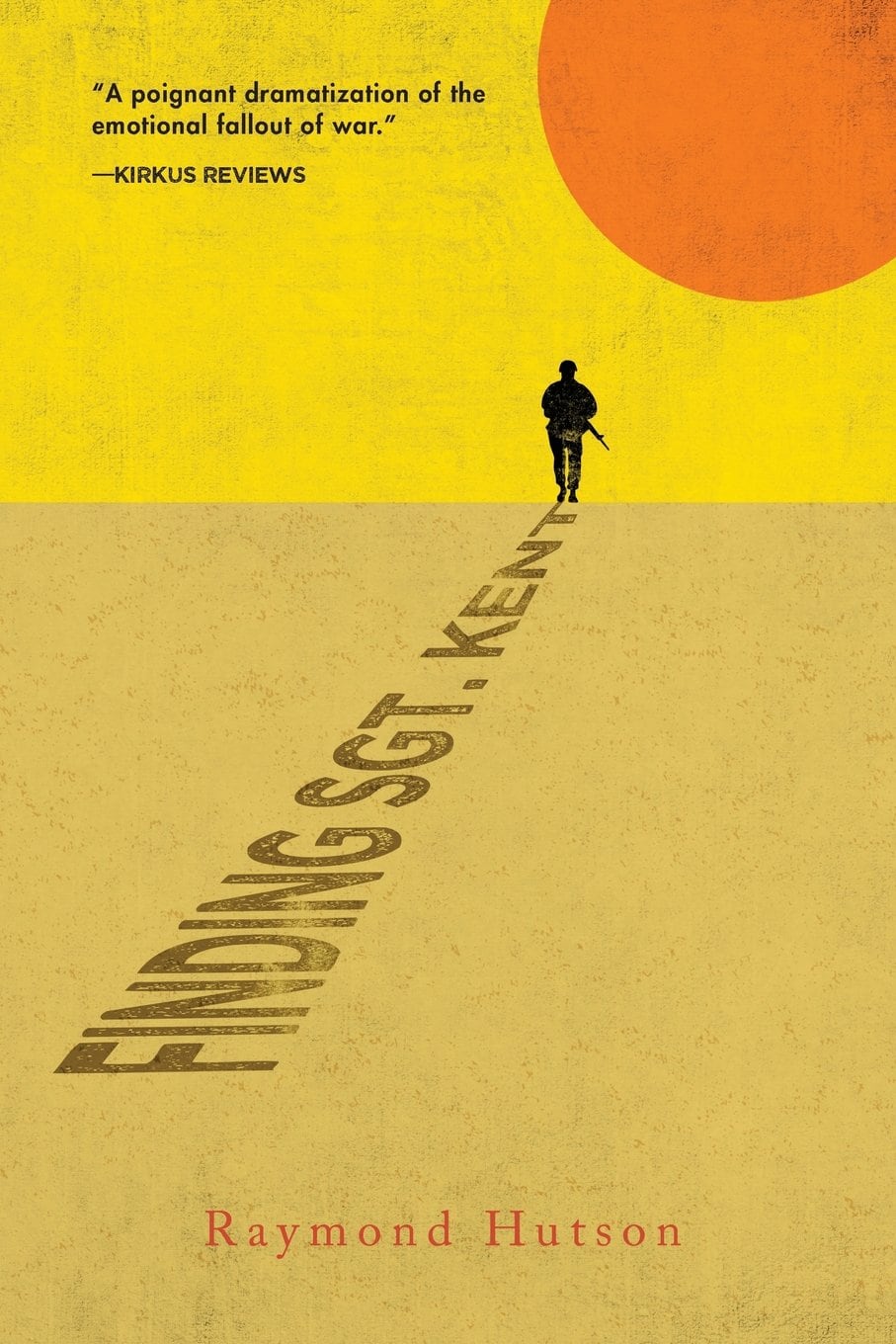
Finding Sgt. Kent by Raymond Hutson, Koehlerbooks, 208 pages, $16.
The author, a doctor with a Master of Fine Arts in creative writing, “never went to war.” But he “spent 10 years or so caring for veterans of half a dozen wars, in VA hospitals, listening to their stories.” Evidently, he pays attention to professors and patients.
His first novel is a well-constructed portrayal of sniper Army Master Sgt. Robert Kent’s return home after almost two decades’ service, which includes three tours in Afghanistan, two Purple Hearts and a Silver Star.
No longer in battle, “Kent is no longer the master of his world, which now includes civilians.
“It’s weird. In the Army everybody’s on the same side,” Kent says. “Here, everybody’s for themselves,” and he thinks everyone is afraid of him.
“Then you’ll need to be an ambassador of good will,” his VA shrink admonishes.
Diplomatically, Kent sets out on his northwest passage. His father never returned from Vietnam and his mother died when he was 15, and his goal is to find remnants of his family. When he locates grandparents who want to embrace their grandson, he feels “trapped, like an imposter who had no business eliciting so much sorrow, or elation.”
His travels bring danger and pain – and a reunion with a fellow soldier.
“Maybe we can protect each other,” she says. “But you’re going to have to forgive yourself.”
He tries, and Hutson helps.
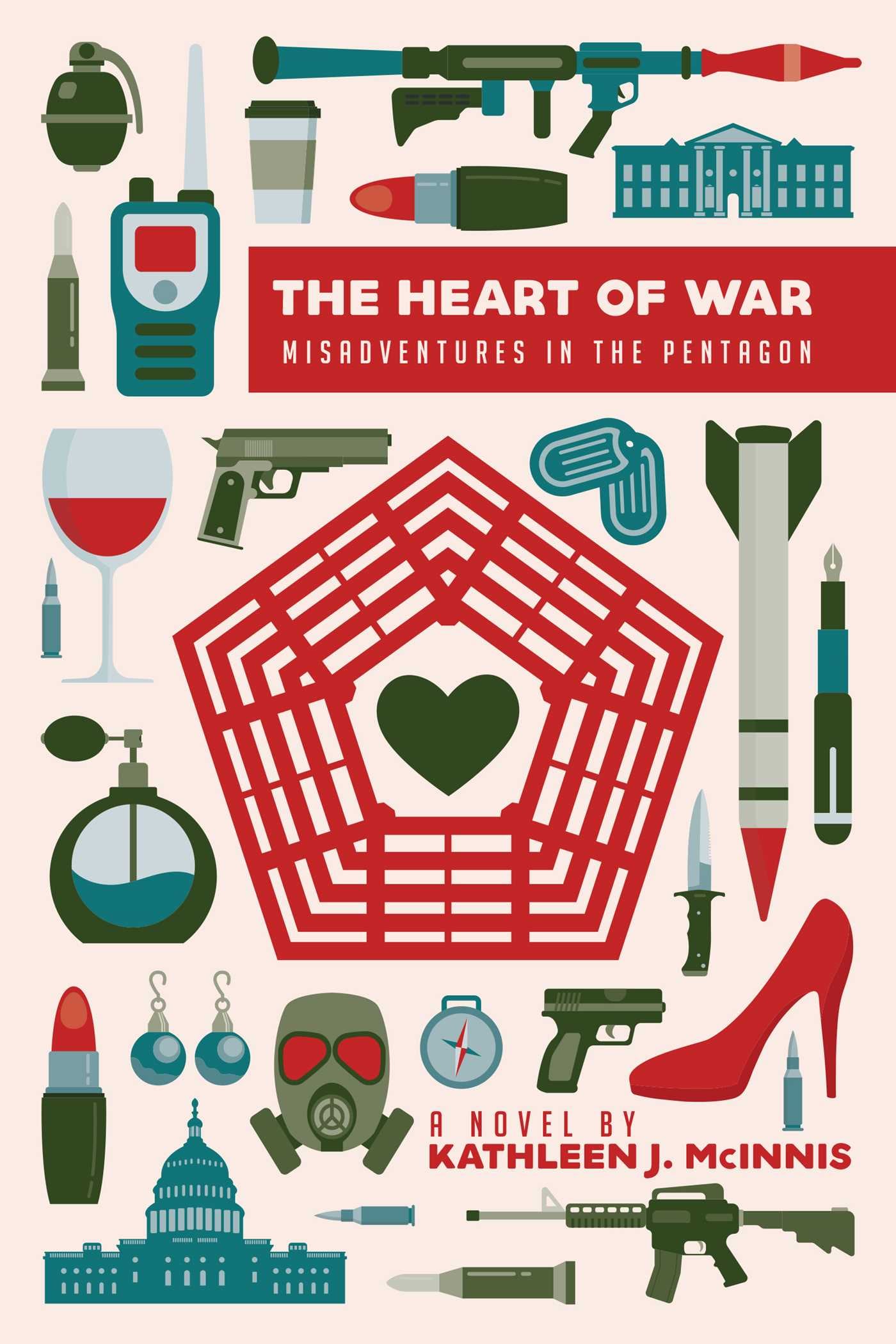
The Heart of War: Misadventures in the Pentagon by Kathleen J. McInnis, Post Hill, 272 pages, $16.
The author is a “base brat” and Air Force daughter with a Ph.D. in war studies, a CV that lists the Defense Department, a chapter in “Strategy Strikes Back” and, in December, a book about NATO and Afghanistan. Heady stuff.
Relax. Her first novel is a comedy of military manners, ambitiously promoted as “The Devil Wears Prada” meets the Pentagon. Maybe not so much. How about “Ms. Adventures in the Pentagon”?
Dr. Heather Reilly, sister of a posthumous recipient of a Medal of Honor, is anti-war, and, ironically, she’s about to plunge into the Pentagon, the last place she ever expects to work. Her heart skips — twice — as she joins “a wave of somber commuters” in Virginia.
After a vapid Pentagon indoctrination, she astutely wonders why they “don’t talk about defense policy in a training course about defense policy.” With equal curiosity, she questions those policies, and her procedural mistakes evolve — you see this coming — into manifestations of official policy.
Meanwhile, she finds an additional purpose in work and life: The memory of her brother.
“If Jon had someone like me back in the Pentagon, maybe he wouldn’t have had to use his body to protect the soldiers around him.”
Jon’s service reminds readers often that the novel and Heather have a conscience.
“Heart” beats perkily — until a terrorist strike abruptly changes the mood and creates “one of those moments” in life “when you feel like something momentous is about to occur” at the office.
“For good or bad, better or worse, the universe is about to shuffle the deck, and the cards will lie where they fall.” Under the weight of cliché, “Ms. Adventures” falls too.
Indivisible: A Novelization by Travis Thrasher, Nelson, 336 pages, $16.
This is the novel based on the movie based on a “true story,” and each coincides with the publication of “Indivisible: On Marriage Under God,” a devotional book. Starring three of TV’s “Grey’s Anatomy” actors, the motion picture opened in 800 theaters Oct. 26.
Instead of eat, pray, love, it’s read, pray, watch. As a result, “Indivisible” could have its 15 minutes’ fame in the media and culture this month, and some will think the news cusp runneth over.
Nobody expects a “novelization” to be literature, and “Indivisible” is not. Yet, even a cynic acquiesces to its sentimentality. Never mind the literary quandary of whether a novel about a living couple is fiction or biography. To the publisher, it’s “fiction.”
The pair is Army chaplain Darren Turner and his wife, Heather, whose faith demands his deploying while Heather home schools the three kids — and befriends two wives whose husbands are also in Iraq. War is hell for the man of Heaven, especially after a soldier loses his legs and another dies.
While the toll is called up yonder, Darren wonders what kind of God permits bad things to happen. He isolates himself from everyone except his devil of a companion, post-traumatic stress, and home becomes hell, too. Learning the dying soldier’s last words — they are a hats off to his chaplaincy — Darren finds comfort amid despair. He is reminded that “each step of the ladder of his life had led to this place,” and a reader quickly figures that it’ll soon be onward for the Christian soldier.
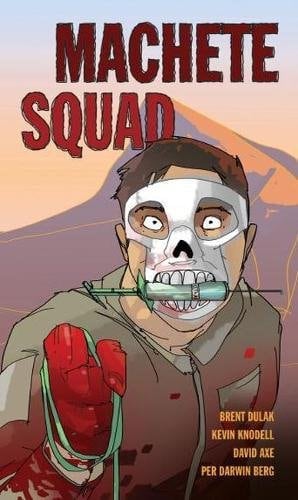
Machete Squad by Brent Dulak, Kevin Knodell and David Axe with illustrations by Per Darwin Berg, Dead Reckoning, 160 pages, $19.
Get past the cover image, which looks like Freddy Kreuger’s cousin and conflicts with the tone of a sensitive story. Iraq and Afghanistan veteran Dulak relives his experiences as a sergeant in charge of a medical unit that ties off amputations — “machete medicine” — as a routine duty.
Inside, relying on few words and a talented illustrator to fill in the cerebral blanks, the effective memoir is a peek into the mind of the young soldier with doubts — “I don’t want to do this “ — before he deploys to Afghanistan in 2012.
“You guys need to just not die until the Afghan Army takes over security next year,” he hears upon arrival.
While in Sperwan Ghar he recalls being in Iraq, where he defies an officer who wants no part of wounded Iraqi children.
“This facility is for coalition casualties. We can’t take all these Hadjis,” the major tells him.
“I’m going to bring you every casualty that comes in,” he replies. “Whatever you decide to do is on you.”
The austere settings are vast in scale yet feel intimate, as though you are seeing the world through Dulak’s eyes. Berg’s drawings expertly use color (warm and cool) and depth (shadows and angles) to convey desolation that looks destructive and mountains that look mysterious.
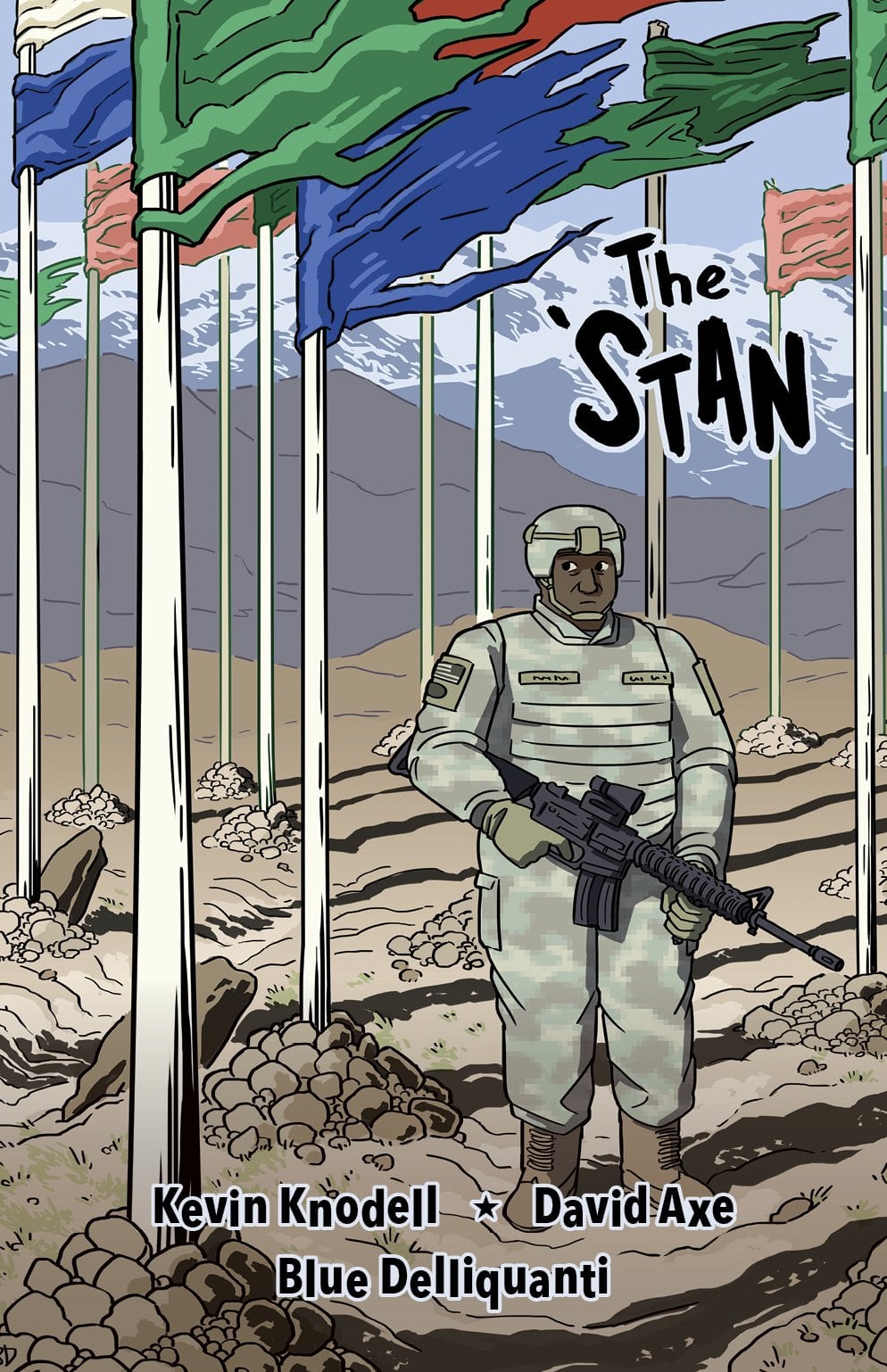
The ’Stan by Kevin Knodell and David Axe; illustrations by Blue Delliquanti, Dead Reckoning, 128 pages, $17.
The editor says the U.S. is entering its 18th year in Afghanistan and “men and women will soon be fighting a war that started before they were born.”
The writers sustain the theme in 17 short reports, each in the eye of veterans — military and civilian. But if ’Stan itself remains a work in progress after nearly two decades, "‘Stan” feels incomplete also.
Unlike reality, the narratives are over before you know it. The content is familiar to a military readership, even if the format is different.
You know: A soldier buys Chinese machine guns from a Pakistani. An Afghanistan interpreter tries to get his family out of there. A Hooters server proves “women have been in combat this entire war.” Stateside veterans decry fireworks on the Fourth.
As art, “’Stan” feels more “Doonesbury” than dire, and some characters’ eyes are as round as Sgt. Orville P. Snorkel’s in “Beetle Bailey.” The mixed visual messages inadvertently demonstrate the challenge in presenting serious narrative — whether nonfiction or novel or news — as art. How do you show dramatic action in “graphic novel” form without ending up resembling a newspaper’s comics section?
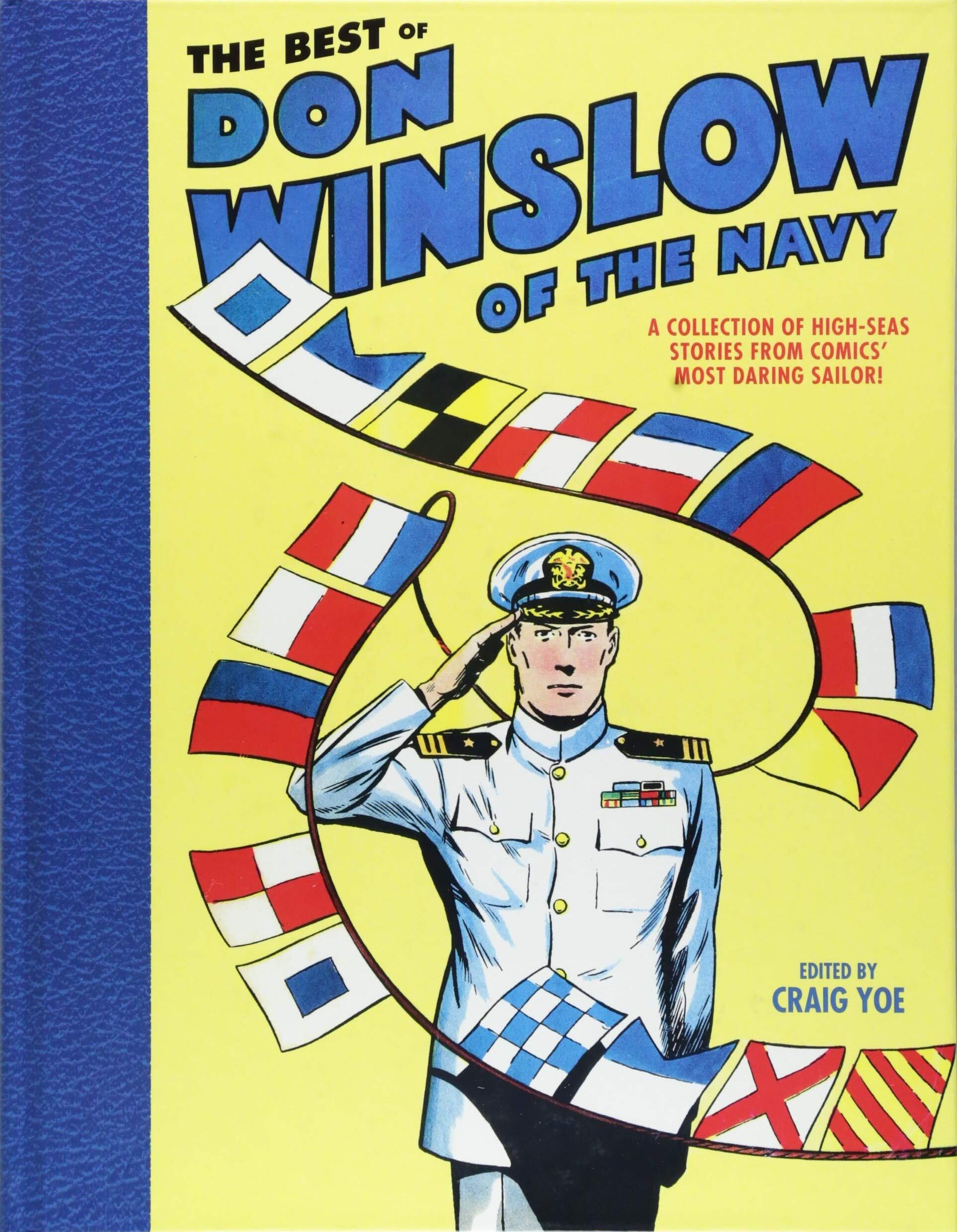
The Best of Don Winslow of the Navy: A Collection of High-Seas Stories from Comics’ Most Daring Sailor edited by Craig Yoe, Dead Reckoning, 272 pages, $30.
The fiction portion of the NIP plunge into graphic storytelling shines in this reprint from the World War II era.
Don, a Superman in sailor’s uniform, was created by a World War I veteran and Navy reservist when the Navy needed a marketing gimmick to recruit men from “the “landlocked” Midwest.
The “tall, stalwart, handsome” Winslow is called to serve between the 1930s and 1950s in comic books, on radio and in a movie serial. The “Best” reproduces action-filled suspense and is charming despite its reflecting a period when only brave white men and decorative and-or deceitful white women populated popular culture.
Winslow is always in dress uniform and always quick to use his fist on bad guys. When his foil is the physically strong female population of Amazon Island, he uses mirrors to distract the ladies. “All women are alike when they get in front of a mirror,” the clever commander says. (Where he gets the full-length glass is unexplained.)
Update the dated social norms and “Don” is a model for today’s illustrators and thriller writers.
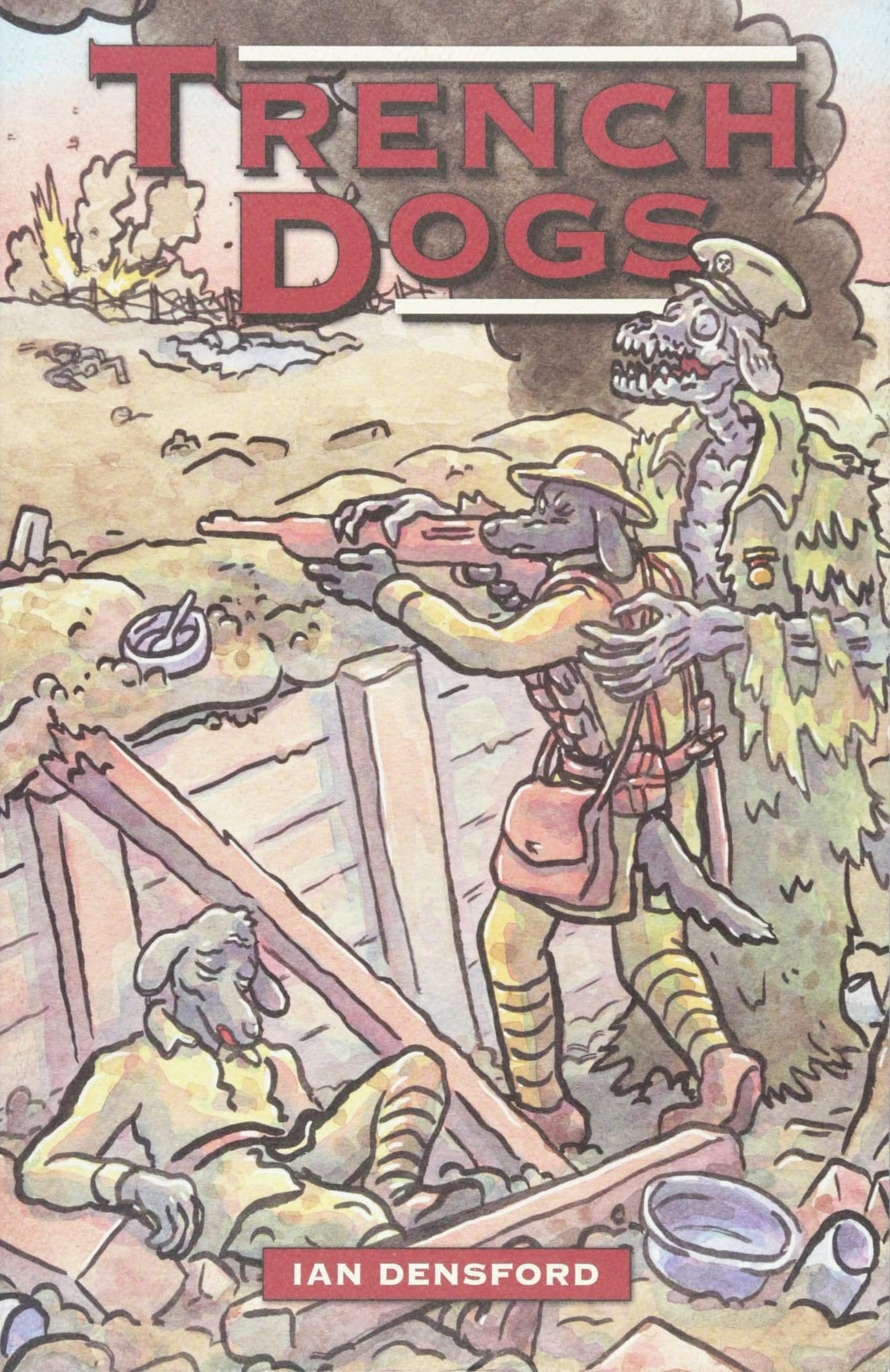
Trench Dogs by Ian Densford, Dead Reckoning, 184 pages, $19.
In this contemporary view of World War I, “Dogs” has 528 continuous panels (each roughly 2” x 5”) that narrate, without text balloons, outrageous early 20th Century war-fighting practices.
The story is continuous, like the single-tracking shot of Dunkirk in the movie “Atonement.” The information is from documented history but the telling is fresh. Even without a dog in the fight, you’ll agree that using countless canine characters as soldiers is a clever move, one that allows troops to seem like the human-faceless fodder their nations consider them to be.
Author-illustrator Densford uses thick lines to draw the myriad, muddy mutts as they are hit by machines on land, in air and at sea. His art looks like the school-boy doodles by an untrained doughboy — down to “BAM” and “BOOM” labels, which are intrusive and, given the success of the drawings, unnecessary.
Want more? These books are noted but not reviewed.
FICTION
Ohio by Stephen Markley, Simon & Schuster, 496 pages, $26.
A funeral for a soldier killed in Iraq opens this first novel, about classmates 10 years after graduation. Another classmate is “a shy veteran of three tours in Iraq” whose home for a date with a “sweetheart he’s tried to forget.”
Dark Winter: A Jake Mahegan Novel by Anthony J. Tata, Kensington, 464 pages, $26.
Former Delta Force Capt. Mahegan, in his fifth thriller by the Fox News commentator and retired Army brigadier general, fights cyber terrorists who pull the plug on defense operations and power grids.
Man of War: An Eric Steele Novel by Sean Parnell, Morrow, 368 pages, $28.
The Afghanistan veteran who (with a co-author) wrote the 2012 memoir, “Outlaw Platoon,” about serving with the Army’s 10th Mountain Division, writes a first thriller about an Afghanistan veteran in clandestine service.
A Borrowing of Bones by Paula Munier, St. Martin’s, 352 pages, $27.
In the first of a series, says the optimistic publisher, a retired soldier and her retired Belgian Malinois military working dog — plus a game warden and his canine — solve a mystery and “keep the citizens of Vermont safe.”
American Journal: 50 Poems for Our Time edited by Tracy K. Smith, Graywolf and Library of Congress, 128 pages, $14.
The anthology of contemporary poetry selected by the U.S. Poet Laureate includes “Phantom Noise” by Army veteran Brian Turner and “The Long Deployment” by Jehanne Dubrow, the wife of a Navy officer.
Restless Souls by Dan Sheehan, Ig (CQ) , 256 pages, $17.
On the road from Ireland to California in the 1990s with three Irish men, including one who suffers from traumatic stress after three years in Sarajevo.
The Iceman by P.T. Deutermann, St. Martin’s, 320 pages, $27.
The titular Iceman cometh for German then Japanese ships in this suspense tale, and his crew wonders whether “their iron-willed skipper will bring them home alive.” The 21st novel by a retired Navy captain.
Without Fear: A Hunter Stark Novel by Col. David Hunt and R.J. Pineiro, Forge, 528 pages, $30.
The Fox News analyst and retired Army officer and his co-author offer a thriller with a buried Soviet nuclear bomb, the Taliban, Al Qaeda, Saudi Arabia, Russian mafia and the Mossad. What could possibly go wrong?
War Debris: Tales of the Old Army by Emmett E. Slake, Mill City, 265 pages, $16.
Twenty-one “fictional meanderings” by a 30-year Army veteran whose service “encompassed” the Korean and Vietnam wars.
NONFICTION
African American Officers in Liberia: A Pestiferous Rotation, 1910-1942 by Brian G. Shellum, Potomac, 306 pages, $22
A retired Army officer looks at “a monumental piece of missing American history”: Why 17 black officers were “instruments of imperialism” while training forces in West Africa. How’d it go? “Pestiferous” is a clue.
Valley Forge by Bob Drury and Tom Clavin, Simon & Schuster, 432 pages, $30.
This story of “an underdog United States toppling an empire” notes George Washington’s political prowess in fighting both the British and the critics in Congress.
War Animals: The Unsung Heroes of World War II by Robin Hutton, Regnery, 466 pages, $30.
With the release of this “heart-warming” history, the “dogs, horses, mules, pigeons — and even one cat” who served in the fight against Germany and Japan are no longer unsung.
Day of the Rangers: The Battle of Mogadishu 25 Years On” by Leigh Neville, Osprey, 352 pages, $30.
The Australian military writer carefully revisits and documents what happens in Somalia October 1993 and, in an appendix, what happens in the 2001 movie that didn’t really happen in real life.
A Fierce Glory: Antietam — the Desperate Battle That Saved Lincoln and Doomed Slavery by Justin Martin, Da Capo, 336 pages, $28.
The biographer of Frederick Olmsted, Walt Whitman and Alan Greenspan turns to Sept. 17, 1862, and the fight beside a creek near Sharpsburg, Md., where 3,654 soldiers die on “America’s bloodiest day.”
Fallout: Conspiracy, Cover-Up and the Making of the Atomic Bomb by Peter Watson, PublicAffairs, 432 pages, $28.
The journalist and historian says “a series of lies, pretenses and deceptions between the Allies resulted in the most dangerous killing machine in history.”
The Escape Artists: A Band of Daredevil Pilots and the Greatest Prison Break of the Great War by Neal Bascomb, Houghton, 336 pages, $28.
British prisoners want to break out of Holzminden, “a land-locked Alcatraz” run by a German commandant who doesn’t want anybody to leave the place alive. At the end of the book is a list of escapees — and the “recaptured.”
Never in Finer Company: The Men of the Great War’s Lost Battalion by Edward G. Lengel, Da Capo, 368 pages, $28.
Devastation and survival in the Argonne forest in World War I . The focus is on three soldiers (Maj. Charles Whittlesey, Capt. George McMurtry and Sgt. Alvin York) and a journalist (Damon Runyan).
Reckless: Henry Kissinger and the Tragedy of Vietnam by Robert K. Brigham, Public Affairs, 320 pages, $28.
“Personal political rivalries and strategic confusion” drive the secretary of state. Based on “recently released material” from the Nixon Presidential Library, Kissinger’s papers at Yale, and archives in Ho Chi Minh City.
The Returned: They Left to Wage Jihad, Now They’re Back by David Thomson, translated by Gregory Flanders, Polity, 240 pages, $20.
The French journalist interviews men and women who went to Syria to join jihadist groups, and he analyzes the “social, religious, political, familial and psychological factors that push people to violent extremism.”
Operation Kinetic: Stabilizing Kosovo by Sean M. Mahoney, Potomac, 512 pages, $39.
The Royal Military College of Canada historian and author of books about Afghanistan and nuclear weapons turns to NATO’s Kosovo Force to “provide a blueprint for stabilizing operations around the world.”
Sword and Scimitar: 14 Centuries of War Between Islam and the West by Raymond Ibrahim, Da Capo, 352 pages, $28.
The most recent of the eight battles in this survey occurs in 1683. The current war between the religious states, including the Islamic State one, is nothing new, and the West ought to remember that.
Tin Can Titans: The Heroic Men and Ships of World War II’s Most Decorated Navy Destroyer Squadron by John Wukovits, Da Capo, 352 pages, $19.
The 2017 book is the recipient of the year’s Samuel Eliot Morison Award for Naval Literature.









